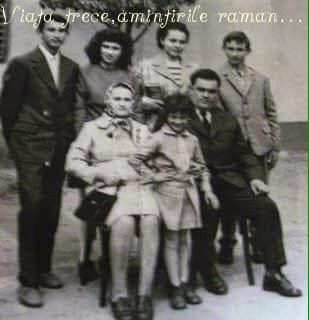About Me

- Raveca
- Sunt un om,ca si tine.Un calator prin mintea ta.Ca m-am nascut nu e vina mea,ca am trait,e multumirea mea,dar cum ma voi duce,e planul lui Dumnezeu!
Friday, October 23, 2020
Dupa ani de zile...
O zi de intalnire,dupa zeci de ani,si am ajuns mai tari.Nu suntem tatari,suntem muscati de tantari,dupa atata amar.Anii au trecut,si din nou impreuna am ajuns.In familie la Dorel si Ilonka Micula,cu Isfanestii si surorile Isfan cu familia.Multumim Domnului pentru Harul minunat,ca din nou ne-am adunat,si pe Domnul l-am laudat!Povesti multe am depanat,lacrimi multe pe fata ne-au brazdat,si am ajuns in anul 2020 in Octombrie,si multumim din nou,o ce Har,minunat!
However...
A Harvard scientist says the drugs used to treat depression are effective,but for many,it's not the active ingredient that's making people feel better.It's the placebo effect.Do antidepressants work?Since the introduction of Prozac in the 1980s,prescriptions for antidepressants have soared 400 percent, with 17 million Americans currently taking some form of the drug. But how much good is the medication itself doing?The difference between the effect of a placebo and the effect of an antidepressant is minimal for most people,says Harvard scientist Irving Kirsch.Will Kirsch's research, and the work of others, change the $11.3 billion antidepressant industry? Lesley Stahl investigates.Irving Kirsch is the associate director of the Placebo Studies Program at Harvard Medical School, and he says that his research challenges the very effectiveness of antidepressants.Irving Kirsch: The difference between the effect of a placebo and the effect of an antidepressant is minimal for most people.Lesley Stahl: So you're saying if they took a sugar pill, they'd have the same effect?Irving Kirsch: They'd have almost as large an effect and whatever difference there would be would be clinically insignificant.Stahl: But people are getting better taking antidepressants. I know them.Kirsch: People get better when they take the drug. But it's not the chemical ingredients of the drug that are making them better. It's largely the placebo effect.Irving Kirsch's specialty has been the study of the placebo effect: the taking of a dummy pill without any medication in it that creates an expectation of healing that is so powerful, symptoms are actually alleviated.Kirsch, who's been studying placebos for 36 years, says "sugar pills" can work miracles.Kirsch: Placebos are great for treating a number of disorders: irritable bowel syndrome, repetitive strain injuries, ulcers, Parkinson's disease.Even traumatic knee pain. In this clinical trial some patients with osteoarthritis underwent knee surgery. While others had their knees merely opened and then sewn right back up.Kirsch: And here's what happened. In terms of walking and climbing, the people who got the placebo actually did better.In medical research, placebos are given as control treatments and depend on the use of measured deception. Common placebos are inert tablets, sham surgery,[3] and other procedures based on false information.[1] However, placebos can also have a surprisingly positive effect on a patient who knows that the given treatment is without any active drug, as compared with a control group who knowingly did not get a placebo.[4]The placebo effect is the measurable, observable, or felt improvement in health or behavior not attributable to a medication or invasive treatment that has been administered. [new] The placebo effect is not mind over matter; it is not mind-body medicine. 'The placebo effect' has become a catchall term for a positive change in health not attributable to medication or treatment.As is explained below, the change can be due to many things, such as regression to the mean, spontaneous improvement, reduction of stress, misdiagnosis.
Subscribe to:
Comments (Atom)
Vizita sa terminat…
Am fost aici in vizita la Dallas,si azi,cu ajutorul Domnului,ma intorc la Arizona.Multumesc de hospitalitate,si nepoteiilor mei,le doresc m...

-
My uncle Ioan Nelu Isfan,Nelu Frizerul,went to be with Jesus,he joined his wife Tusa Mimi,My mom,Elena,my uncle Sami Isfan,my Aunt Tusa A...
-
Timpul a trecut,nu imi vine sa cred,Lucas a terminat liceul.Ce repede a trecut patru ani de scoala.Dar parca si mai repede a trecut,18 an...
-
Minneapolis is a major city in Minnesota that forms "Twin Cities" with the neighboring state capital of St.Paul.Bisected by the M...








